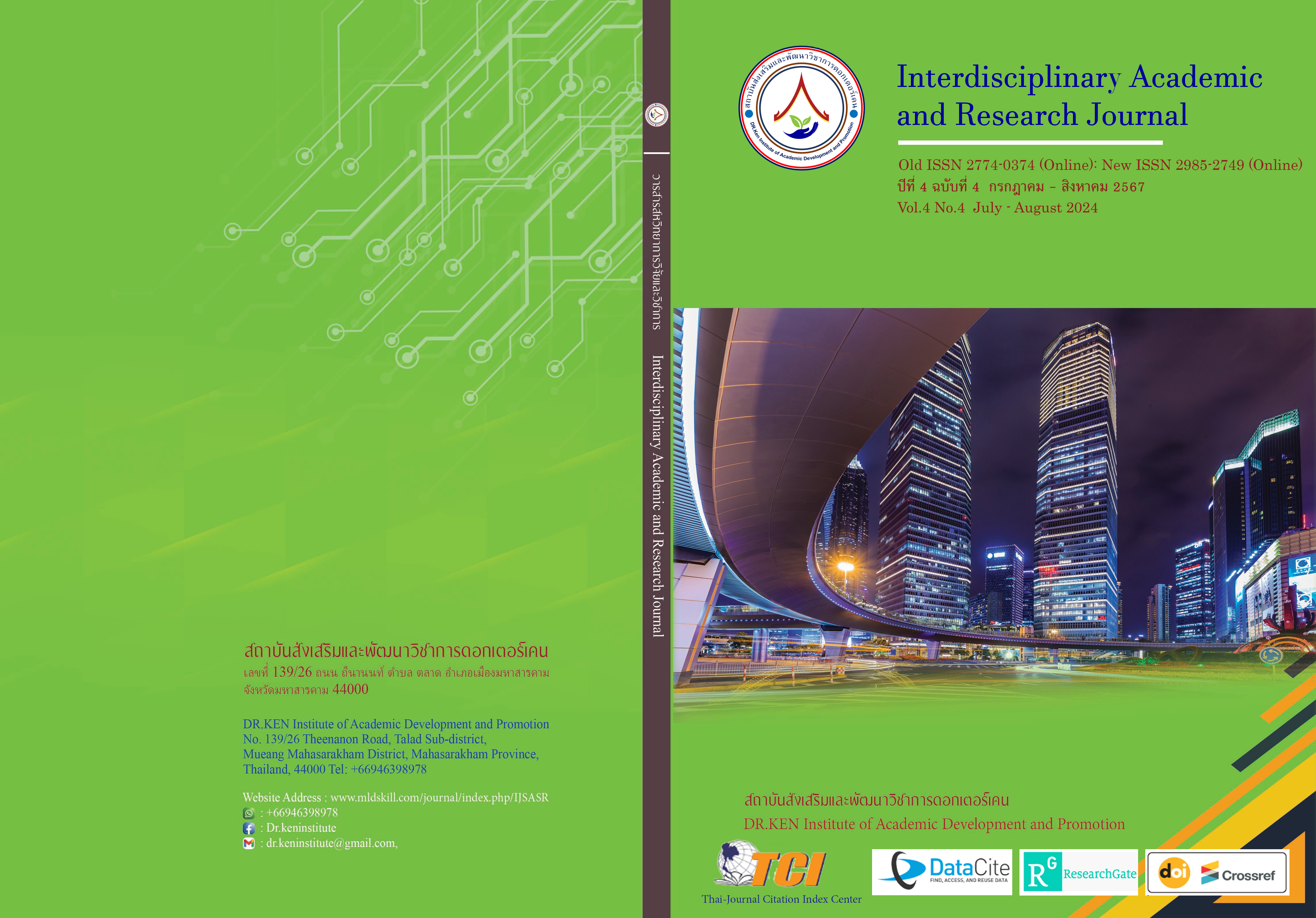The Effects of Ethical Training Reflection on Developing Professional Experiences of Student Teachers
DOI:
https://doi.org/10.60027/iarj.2024.276639Keywords:
Reflection; , Ethical Training; , Teacher Professional Experiences; , Education for Sustainable DevelopmentAbstract
Background and Aims: Enhancing the quality of education to align with Sustainable Development Goals (SDGs) is a significant challenge for teacher education institutions, particularly in strengthening professional experiences and ethics for student teachers. This research aims to examine the effects of ethical training reflection on the developing professional experiences of student teachers, to synthesize key themes that reflect the relationship between ethical training, reflection process, and self-development in the dimension of being a teacher.
Methodology: This qualitative research collected data from an online reflective collection with 87 student teachers who participated in an ethics education program at Weerawonsaram Temple Muang Chaiyaphum that emphasizes Dhamma practice and reflection. The data were then analyzed using thematic analysis to identify key themes that reflect the effects of ethical training integrated with reflection on self-development for supporting professional teaching.
Results: The analysis revealed five key themes: 1) punctuality promotes self-responsibility and discipline, 2) restraint in physical actions, speech, and mind is fundamental to being a teacher, 3) chanting, meditation, and alms offering help calm the mind, enhance mindfulness and generosity, 4) observing absentmindedness leads to self-understanding, mindfulness, and focus on the present, which benefit teaching and self-development, 5) analyzing one's own Dhamma practice process leads to understanding and appreciating the value of Dhamma practice in developing the mind and teaching skills. These five themes reflect the interconnected relationship between ethical training, reflection, and self-development in the dimensions of mind, thought, and teaching behavior, leading to professional teaching.
Conclusion: Ethical training that emphasizes reflection coupled with self-reflection is a significant process in developing teacher professional experiences in the 21st century, which requires the development of teachers in the dimensions of knowledge, skills, and ethics simultaneously. This will lead to the creation of quality teachers who are ready to drive sustainable development in the future.
References
ข้อบังคับคุรุสภา ว่าด้วยมาตรฐานวิชาชีพ (ฉบับที่ 4) พ.ศ. 2562. (2562, 20 มีนาคม). ราชกิจจานุเบกษา. เล่ม 136 ตอนพิเศษ 68 ง. หน้า 18-20.
ดวงเดือน พันธุมนาวิน. (2524). การพัฒนาจริยธรรม: ตำราจิตวิทยา. กรุงเทพฯ: สถาบันวิจัยพฤติกรรมศาสตร์ มหาวิทยาลัยศรีนครินทรวิโรฒประสานมิตร.
ดุสิต ปรีพูล, พระมหาดาวสยาม วชิรปญฺโญ และโสวิทย์ บำรุงภักดิ์. (2562). การพัฒนาจริยธรรมของผู้ประกอบวิชาชีพครูในสังกัดสำนักงานเขตพื้นที่การศึกษาประถมศึกษากาฬสินธุ์ เขต 1. วารสารบัณฑิตศึกษามหาจุฬาขอนแก่น, 6(4), 97-108.
นิตยา ทองจันฮาด, สมาน เอกพิมพ์ และสุรกานต์ จังหาร. (2563). แนวทางการพัฒนาหลักสูตรฝึกอบรมจิตลักษณะความเป็นครูของนักศึกษาคณะศึกษาศาสตร์ มหาวิทยาลัยการกีฬาแห่งชาติ. วารสารวิชาการ มหาวิทยาลัยราชภัฏมหาสารคาม, 14(2), 75-86.
ประมวลจริยธรรมข้าราชการครูและบุคลากรทางการศึกษา. (2564). ราชกิจจานุเบกษา. เล่ม 138 ตอนพิเศษ 213 ง. หน้า 67-68.
พระพรหมคุณาภรณ์ (ป.อ.ปยุตโต). (2557). ธรรมนูญชีวิต พุทธจริยธรรมเพื่อชีวิตที่ดีงาม. กรุงเทพฯ: ธรรมะสภา.
ราชบัณฑิตยสถาน. (2554). พจนานุกรมออนไลน์ ราชบัณฑิตยสถาน. Retrieved from: https://dictionary.orst.go.th/
วศิน อินทรสระ. (2541). พุทธจริยศาสตร์. กรุงเทพฯ: ทองกวาว.
เศรษฐิยา เปรื่องพิชญาธร และพวงเพ็ญ อินทรประวัติ. (2566). ผลการสะท้อนคิดด้านสมรรถนะการจัดการเรียนรู้ของนักศึกษาฝึกประสบการณ์วิชาชีพ. วารสารศึกษาศาสตร์ มหาวิทยาลัยสงขลานครินทร์ วิทยาเขตปัตตานี, 34(3), 92-104.
สิทธิพงษ์ สุพรม, ธีรวุฒิ เอกะกุล, และ วรรณ์ดี แสงประทีปทอง. (2566). รูปแบบการพัฒนาครูโดยใช้การประเมินแบบสะท้อนคิดที่มีผลต่อสมรรถนะครูด้านการวัดและประเมินผลการเรียนรู้ระดับมัธยมศึกษา. วารสาร มจร สังคมศาสตร์ปริทรรศน์, 12(2), 92-105.
Braadbaart, I., Vuuregge, A., Beekman, F., Scheijen, S., Muijlwijk-Koezen, J., & Scholten, D. (2023). Leveraging the ALACT reflection model to improve academic skills development in bachelor students: A case study. The Asian Conference on Education 2022: Official Conference Proceedings, 76. https://doi.org/10.22492/issn.2186-5892.2023.76
Braun, V., & Clarke, V. (2006). Using thematic analysis in psychology. Qualitative Research in Psychology, 3(2), 77–101. https://doi.org/10.1191/1478088706qp063oa
Korthagen, F.A.J. (2010). Teacher reflection: What it is and what it does. In E. G. Pultorak (Ed.), The purposes, practices, and professionalism of teacher reflectivity: Insights for twenty-first-century teachers and students (pp. 377-401). Lanham, ML: Rowman & Littlefield.
Korthagen, F.A.J., & Kessels, J.P.A.M. (1999). Linking theory and practice: Changing the pedagogy of teacher education. Educational Researcher, 28(4), 4-17.
Korthagen, F.A.J., & Nuijten, E.E. (2018). Core reflection: Nurturing the human potential in students and teachers. In J. P. Miller, K. Nigh, M. J. Binder, B. Novak, & S. Crowell (Eds.), International handbook of holistic education (pp. 89-99). New York, NY: Routledge.
Korthagen, F.A.J., & Vasalos, A. (2005). Levels in reflection: Core reflection as a means to enhance professional development. Teachers and Teaching: Theory and Practice, 11(1), 47-71.
UNESCO. (2017). Education for sustainable development goals: Learning objectives. UNESCO Publishing.
Wegner, C., Weber, P., & Ohlberger, S. (2014). Korthagen's ALACT model: Application and modification in the science project "Kolumbus-Kids". Themes in Science and Technology Education, 7(1), 19-34.
Williams, J., & Power, K. (2009). Using core reflection in teacher education [Paper presentation]. Annual conference of the Australian Teacher Education Association (ATEA), Albury, Australia, June 28 - July 1, 2009.
Downloads
Published
How to Cite
Issue
Section
License
Copyright (c) 2024 Interdisciplinary Academic and Research Journal

This work is licensed under a Creative Commons Attribution-NonCommercial-NoDerivatives 4.0 International License.
Copyright on any article in the Interdisciplinary Academic and Research Journal is retained by the author(s) under the under the Creative Commons Attribution-NonCommercial-NoDerivatives 4.0 International License. Permission to use text, content, images, etc. of publication. Any user to read, download, copy, distribute, print, search, or link to the full texts of articles, crawl them for indexing, pass them as data to software, or use them for any other lawful purpose. But do not use it for commercial use or with the intent to benefit any business.
















.png)


